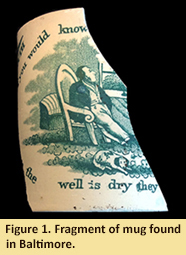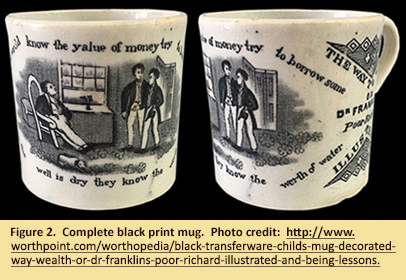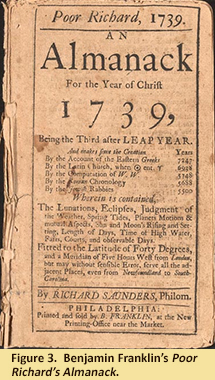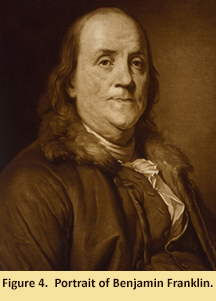Curator's Choice 2015
Lessons for Children
September 2015
By Madison Pearson, MAC Lab Intern
 Nowadays, teaching children the difference between good and bad can be a difficult thing, but it was also difficult in earlier times. This child’s mug (Figure 1), found on the site of a mid-nineteenth-century store in Baltimore, helped give children valuable information on how they should behave as they got older.
Nowadays, teaching children the difference between good and bad can be a difficult thing, but it was also difficult in earlier times. This child’s mug (Figure 1), found on the site of a mid-nineteenth-century store in Baltimore, helped give children valuable information on how they should behave as they got older.
Ceramics made specifically for children began production in Staffordshire around 1790 (Riley 1991). Mugs and other vessels were printed with designs of everyday scenes which drew in both parents and children, making it more likely that the products would be bought. In the early 1800s, these mugs were being marketed more towards small children, and parents would buy ceramics with their children’s names on them as presents (Moonan 1998).  It is not known if these ceramics were meant to be used, or just admired as decorations. Children’s china was normally made of sturdy glazed earthenware and was much less expensive than porcelain and silver cups. These Staffordshire ceramics were given to children, both good and bad, to show them what they had done. Some were printed with uplifting, positive messages, whereas others may have had quarreling children on them to represent something bad a child had recently done.
It is not known if these ceramics were meant to be used, or just admired as decorations. Children’s china was normally made of sturdy glazed earthenware and was much less expensive than porcelain and silver cups. These Staffordshire ceramics were given to children, both good and bad, to show them what they had done. Some were printed with uplifting, positive messages, whereas others may have had quarreling children on them to represent something bad a child had recently done.
 Dating around 1830, this green Staffordshire transferware child’s mug was produced in many colors, including black, to appeal to a wider audience (Figure 2). Displayed on this mug are two adages from Benjamin Franklin’s The Way to Wealth or Poor Richard Illustrated (Figure 3), originally published in 1758. They read “If you would know the value of money try to borrow some” and “When the well is dry they know the worth of water” with a scene of two boys asking their father, who appears to be a businessman, for money. This mug, designed to make children realize money is not to be wasted, was used to teach frugality.
Dating around 1830, this green Staffordshire transferware child’s mug was produced in many colors, including black, to appeal to a wider audience (Figure 2). Displayed on this mug are two adages from Benjamin Franklin’s The Way to Wealth or Poor Richard Illustrated (Figure 3), originally published in 1758. They read “If you would know the value of money try to borrow some” and “When the well is dry they know the worth of water” with a scene of two boys asking their father, who appears to be a businessman, for money. This mug, designed to make children realize money is not to be wasted, was used to teach frugality.
 Benjamin Franklin (Figure 4) was a well-known entrepreneur, printer and writer. Poor Richard’s Almanack became one of his most sold works, although he did not actually write it (Green and Stallybrass 2006). Aphorisms contained in the almanac began to spread and become more well-known. Although the almanack was last published in 1758, the sayings were not used in production on Staffordshire mugs until the 1830s. Well-known quotes from various authors were used by ceramic producers to make mugs for children that would be in high demand, and provide a good message for these youngsters.
Benjamin Franklin (Figure 4) was a well-known entrepreneur, printer and writer. Poor Richard’s Almanack became one of his most sold works, although he did not actually write it (Green and Stallybrass 2006). Aphorisms contained in the almanac began to spread and become more well-known. Although the almanack was last published in 1758, the sayings were not used in production on Staffordshire mugs until the 1830s. Well-known quotes from various authors were used by ceramic producers to make mugs for children that would be in high demand, and provide a good message for these youngsters.